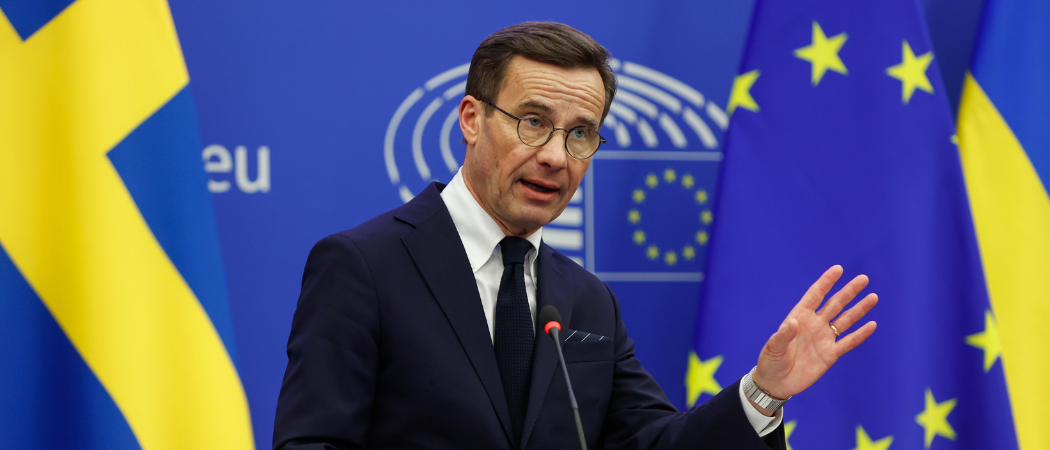Ensuring Europe can innovate and grow its companies in the face of global competition will be one of the priorities of Sweden’s six-month reign of the EU

Swedish Prime Minister Ulf Kristersson speaking at the European Parliament as the country kicks off its presidency of the EU. Photo: Mathieu Cugnot / European Union 2023
Innovation and strategic autonomy will be in the spotlight for the next six months, as Sweden spearheads the presidency of the EU.
The outlook for Europe’s leadership in global innovation is bleak, but prime minister Ulf Kristersson promised members of the European Parliament to rally EU member states to tackle the issue, in a speech outlining the vision for his country’s presidency.
“Today, we are spending significantly less on research and development than the US or China, and high energy prices may drive investments away from Europe,” said Kristersson. “If we want to maintain our leading knowledge-based economies with innovative industries, we need to step up our game. Therefore, we need a long-term new strategy on EU level to boost competitiveness and productivity.”
Global competitors are not standing still. As the climate crisis looms and economies struggle to subdue inflation, the US and China are upping their investments in key technologies of the future. Trends in clean tech are especially worrying for Europe, which has banked on being a frontrunner in the green transition. Last year, in a blow to the EU’s competitiveness, the US signed off a $700 billion Inflation Reduction Act, which offers support for a wide range of green technologies, including hydrogen and nuclear energy.
“The EU’s response to these developments need to be analysed and discussed as a matter of priority,” Kristersson told MEPs.
As part of the response, he hopes the Swedish presidency will help improve the conditions for businesses, not by campaigning for more subsidies but rather boosting productivity and spending on research and innovation.
There is also a need for clearer frameworks for the green and digital transitions, to empower businesses to innovate, he noted. “If European companies are to produce the energy, make the batteries, the electric cars and the fossil-free steel of the future, they all need good conditions to compete internationally,” Kristersson said.
Also speaking to MEPs in Strasbourg on Tuesday morning, European Commission vice president Maroš Šefčovič promised in the next six months the Commission will work on reducing the negative impact of the US Inflation Reduction Act on the EU’s clean tech sector, noting also that the bloc faces unfair competition from China’s massive subsidies in the sector.
“In response, under the Swedish presidency, we will introduce measures including on strategic raw materials. We also need to update our state aid framework to better facilitate public investment,” said Šefčovič.
The Parliament supports doing more as the EU navigates uncertain times. With the economy in peril and a cost of living crisis unfolding Malik Azmani, president of the Parliament's liberal group, Renew, said, “The best way to fight back it to focus on innovation, secure the green transition and build a modern European and open economy. That’s why we are pleased that innovation is central to your presidency.”
Manfred Weber, president of the Parliament’s centre-right group, stressed the response must be a European effort. While US firms invest six times more in AI than Europeans and the top 10 companies investing in quantum computing are based in the US and China, “We have to pick up this competition, but for us this also means we have to do it at European level,” Weber told the Swedish prime minister.
The Swedish presidency took over the reins on 1 January for six months, as part of the regular EU presidency rotation. On the agenda for research policy, the Swedes intend to focus on the transition to a more transparent and reliable open science publishing system, encourage open and safe sharing of data produced in the EU’s research facilities, and steer debates on how to best exploit synergies between different EU funds dedicated to research and innovation.





 A unique international forum for public research organisations and companies to connect their external engagement with strategic interests around their R&D system.
A unique international forum for public research organisations and companies to connect their external engagement with strategic interests around their R&D system.